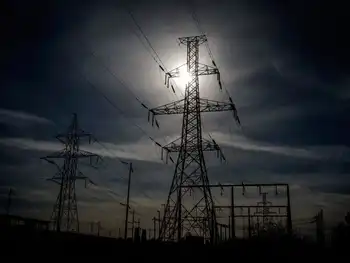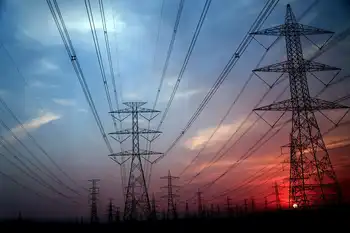Nova Scotia, New Brunswick expand cooperation
FREDERICTON, NEW BRUNSWICK - The New Brunswick and Nova Scotia governments will announce a series of co-operative energy sector initiatives, measures many in the energy and environmental communities are welcoming.
New Brunswick Premier Shawn Graham, Nova Scotia Premier Darrell Dexter and representatives from the two provincial utilities gathered in Fredericton to announce the collaborative measures.
Tim Curry, the president of Atlantica Centre for Energy, said he's not sure exactly what to expect from the announcement, but he welcomes the idea of inter-provincial collaboration.
"We should be exploring opportunities for more regional co-operation and, in fact, interdependence within the Maritimes on the electrical system," Curry said.
Energy Minister Jack Keir said in an interview that co-operation would be expanded in the electricity system.
He said the two governments and utilities have been in discussions for several months.
As well, he said measures will also come with benchmarks so people can measure the progress of the initiatives.
Both New Brunswick and Nova Scotia are also facing stiff renewable energy targets in the next few years. For instance, Nova Scotia wants to have 25 per cent of its energy supplied by renewable sources by 2015.
Brennan Vogel, the energy co-ordinator for Halifax-based Ecology Action Centre, said the two provinces could meet those self-imposed renewable energy targets more easily if they joined forces on projects such as new transmission links.
"It's a piece of a larger puzzle," Vogel said.
"Ultimately we've got a lot of work to be done if we're going to meet these ambitious targets for renewable electricity."
Nova Scotia Power announced in July that it wanted to build a 345-kilovolt power line, which would come with an estimated $200-million price tag, between Nova Scotia and New Brunswick.
The utility said the new interconnection is needed to improve the stability and reliability of the power system between the two provinces.
Nova Scotia Power filed a report with the Utility and Review Board, the province's energy regulator, on June 30, stating land must be acquired and studies conducted on the proposed power line.
As well, the New Brunswick System Operator, the independent agency that ensures the reliability of the province's transmission system, issued a report recently calling for improvements in the electricity transmission system in southeastern New Brunswick.
The report said studies were continuing on how to meet the current and future electricity transmission needs of the interconnections to Nova Scotia and Prince Edward Island. The need for new transmission infrastructure is a familiar refrain in the Atlantic provinces.
The four Atlantic premiers signed a communiqué in December 2008 calling on the federal government to speed up investments in electricity transmission system.
The premiers argued "transmission infrastructure in the region will also allow greater development of intermittent resources, such as hydro, wind and tidal."
This isn't the first time the New Brunswick government has attempted to work with a neighbouring province to help meet its energy needs.
The New Brunswick government entered into a $4.8-billion agreement with Quebec last October to sell NB Power. The deal was dropped in March amid widespread discontent in New Brunswick.
Donald Savoie, the Canada research chair in public administration at the University of Moncton, said many people were frustrated by the ill-fated attempt to sell NB Power.
But he's urging people to keep an open mind about the prospect of working closer with Nova Scotia.
"I would encourage all to take a good, serious look at it," Savoie said.
"If it's in the step of greater co-operation between the two Maritime provinces, I really don't see a downside."
The public policy expert also said he understands that the announcement will be viewed through the prism of the upcoming New Brunswick election campaign.
But Savoie said he hopes any talk of energy co-operation can rise above party politics.
"I think when we talk about co-operation surely we should try to be as non-partisan as possible and look at the merit of it and what they're trying to do," Savoie said.
"We'll have to wait and see. But any willingness to co-operate should, again, transcend partisan politics."
Related News

Only one in 10 utility firms prioritise renewable electricity – global study
LONDON - Only one in 10 of the world’s electric utility companies are prioritising investment in clean renewable energy over growing their capacity of fossil fuel power plants, according to research from the University of Oxford.
The study of more than 3,000 utilities found most remain heavily invested in fossil fuels despite international efforts to reduce greenhouse gas emissions, and some are actively expanding their portfolio of polluting power plants.
The majority of the utility companies, many of which are state owned, have made little change to their generation portfolio in recent years.
Only 10% of the companies in the…




